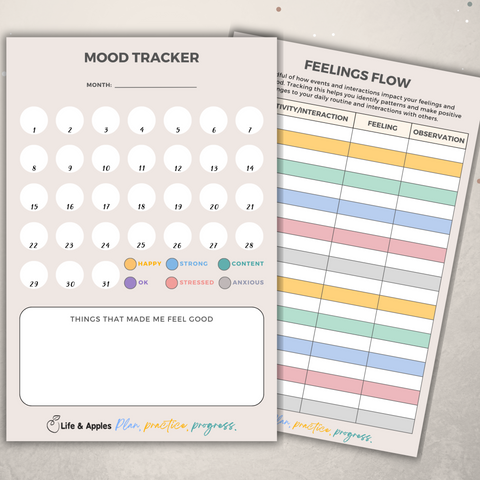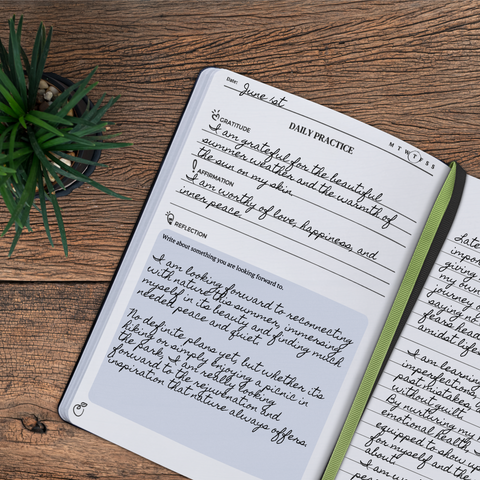In recent years the world, society and media have become increasingly aware of mental health, with anxiety standing out as a pervasive challenge affecting millions. It's a complex condition, often misunderstood and sometimes debilitating, impacting every facet of life. Amidst various therapeutic strategies, one simple yet profound tool is an anti-anxiety journal. This specialized form of journaling offers a unique approach to managing the intricacies of anxiety. In this comprehensive exploration, we delve into what an anti anxiety journal is, its benefits, and its role as a crucial component in managing mental health.
Definition of Anxiety
Explanation of Anxiety as a Mental Health Disorder
Anxiety is a pervasive mental health condition characterized by excessive worry, nervousness, or fear, affecting daily functioning. While anxiety is a normal and often healthy emotion, it becomes a disorder when the feelings become chronic, overwhelming, and disproportionate to the triggering event. Anxiety disorders form a category of mental health diagnoses that lead to excessive nervousness, fear, apprehension and worry. These disorders alter how a person processes emotions and behaves, also causing physical symptoms. Mild anxiety might be vague and unsettling, while severe anxiety may seriously affect day-to-day living.
Symptoms and Common Manifestations
Anxiety symptoms can vary, but they commonly include feelings of panic, fear, and uneasiness. Physical symptoms may also occur, such as restlessness, a fast heartbeat, rapid breathing, sweating, trembling, feeling weak or tired and difficulty concentrating. These manifestations make it challenging to carry out simple daily tasks, severely impacting an individual's quality of life. Anxiety can also appear in various forms, including generalized anxiety disorder (GAD), panic disorder, and social anxiety disorder, each with its unique symptoms and triggers.
Statistics on Anxiety
Prevalence of Anxiety Disorders Globally
Anxiety disorders are among the most common mental health disorders worldwide. According to the World Health Organization (WHO), anxiety disorders are the most common mental disorders worldwide, with an estimated 4% of the global population currently experiencing an anxiety disorder, affecting 301 million people as of 2019. The COVID-19 pandemic has significantly increased the prevalence of these conditions, with initial estimates showing a 26% and 28% increase respectively for anxiety and major depressive disorders in just one year. Additionally, nearly one billion people worldwide suffer from some form of mental disorder, according to the latest UN data, emphasizing the impact of the COVID-19 pandemic on the rates of common conditions such as depression and anxiety, which went up by more than 25%. The prevalence of these disorders can vary significantly by country, age, sex, and socioeconomic status, highlighting the widespread impact of anxiety across different demographics and cultures.
Impact of Anxiety on Different Demographics
Anxiety disorders affect people of all ages and backgrounds, but prevalence rates can vary. For example, research has shown that women are nearly twice as likely as men to be diagnosed with an anxiety disorder. The Anxiety and Depression Association of America (ADAA) indicates that women are nearly twice as likely as men to be diagnosed with an anxiety disorder in their lifetime. The prevalence of any anxiety disorder in the past year was higher for females (23.4%) than for males (14.3%). This data underscores the significant gender disparity in the diagnosis of anxiety disorders, pointing towards a complex interplay of biological, psychological, and possibly sociocultural factors.
Age also plays a critical role, with younger individuals reporting higher levels of anxiety than older adults. Socioeconomic factors, such as income and education level, can influence the likelihood of experiencing anxiety disorders, with those in lower socioeconomic groups often at higher risk due to increased stressors and reduced access to mental health care services.
Impact of Anxiety on Daily Life
Real-life Implications of Living with Anxiety
Living with anxiety can severely impact an individual's daily life, affecting personal and professional relationships, academic performance and job productivity. The constant state of worry and fear can make routine activities challenging, leading to avoidance behaviors and social isolation. Anxiety can also interfere with decision-making, concentration, and sleep, exacerbating the disorder's effects on daily functioning.
Effects on Personal and Professional Life
In personal relationships, anxiety can lead to tension, misunderstandings and conflict, often due to the individual's difficulty in communicating their feelings or needs. Professionally, anxiety may result in missed opportunities, decreased productivity and dissatisfaction at work, potentially leading to job loss or career changes. The pervasive effects of anxiety underscore the importance of effective management strategies, such as the use of an anti-anxiety journal or a CBT journal for mental health, which can offer valuable tools for individuals seeking to understand and manage their anxiety symptoms.
What is an Anxiety Journal?
Definition and Purpose
An anxiety journal is a specialized type of diary designed specifically for individuals experiencing anxiety and stress, serving as a tool to manage and understand their emotions and triggers. Unlike traditional journals, which may focus on daily events or thoughts without a specific structure, an anxiety journal is purposefully used to track feelings, thoughts, and behaviors related to mental health and anxiety. This practice can help individuals identify patterns in their anxiety, triggers, and effective coping mechanisms. The primary aim of using an anti-anxiety journal is to create a self-reflective safe space where one can express concerns, fears, and emotions in a constructive manner, facilitating a process of self-awareness and emotional regulation.
The Science Behind Journaling for Anxiety
Research and Studies
Research on the effectiveness of journaling for mental health, including anxiety and depression, has been positive, demonstrating various benefits. Studies published in prominent psychology and mental health journals have found that regular journaling can significantly reduce symptoms of anxiety and depression, improve mood, and enhance overall mental health.
Psychological Benefits
Journaling aids in processing emotions and thoughts by providing an outlet for expressing feelings that might be difficult to articulate verbally. It can help individuals gain insights into their emotional patterns and triggers, promoting a greater understanding of their anxiety. This process of self-reflection and awareness is a cornerstone of cognitive-behavioral therapy (CBT), which suggests that understanding and changing thought patterns can lead to changes in feelings and behaviors. An anxiety journal or a CBT journal for mental health can thus be a powerful tool in the cognitive processing and management of anxiety.
Physiological Benefits
Beyond psychological benefits, journaling may also have physiological benefits linked to stress reduction. Engaging in reflective writing can lead to a decrease in stress hormones, such as cortisol, thereby reducing the physical symptoms of anxiety. This reduction in stress can have wide-ranging benefits on physical health, including improved immune function, lower blood pressure, and better sleep patterns, contributing to an overall improvement in quality of life.
How Does Journaling Help with Anxiety?
Emotional Release
Writing in an anxiety journal provides a therapeutic effect by allowing for the expression of feelings in a safe and private manner. This emotional release can be particularly beneficial for those who may not feel comfortable sharing their feelings with others or who need a way to process their emotions before discussing them. The act of writing can serve as a form of emotional catharsis, helping to lessen the intensity of anxiety symptoms.
Cognitive Processing
Journaling facilitates cognitive processing by helping individuals to clarify their thoughts and feelings, identify patterns in their anxiety and recognize triggers. This process can lead to a better understanding of the sources of one's anxiety and the development of strategies for managing it. Writing about anxiety triggers and reactions in a journal for depression and anxiety can also aid in distinguishing between rational fears and irrational anxieties, contributing to cognitive restructuring efforts in cognitive-behavioral therapy.
Behavioral Changes
Through regular reflection and tracking of behaviors related to anxiety, journaling can play a crucial role in identifying and modifying maladaptive behavior patterns. By recognizing the situations, thoughts and actions that contribute to anxiety, individuals can begin to make conscious changes to their behavior. This might include avoiding certain triggers, implementing stress-reduction techniques, or practicing positive coping strategies identified through journaling. Over time, these changes can lead to significant improvements in how one manages and experiences anxiety.
What Do You Write in an Anxiety Journal?
Daily Experiences and Feelings
Keeping an anxiety journal involves documenting not just your day-to-day activities but also the emotions and feelings associated with these experiences. This practice offers a holistic view of your life's patterns, including what uplifts you and what brings you down. It's beneficial to note the context of these feelings—where you were, who you were with, and what you were doing—as these details can provide insights into your emotional triggers and joys. A mood tracker or a detailed record of your emotional responses to different situations helps in identifying patterns and themes in your feelings and behaviors, which is a critical step in managing anxiety effectively.
Anxiety Triggers
Identifying and writing about anxiety triggers is crucial for understanding and managing your anxiety. A trigger can be a specific situation, person, thought, or even an environment that brings on feelings of anxiety. In your anxiety journal, describe the moments leading up to and following the onset of anxiety. Note the intensity of your feelings and any other symptoms you experience. This exercise helps in pinpointing the sources of your anxiety, making them less daunting and more manageable. Over time, you'll begin to notice patterns in what triggers your anxiety, allowing for proactive management strategies.

Coping Strategies
Recording effective coping mechanisms in your mental health journal is equally important. Whenever you employ a strategy that helps alleviate your anxiety, write it down. This could include breathing exercises, physical activity, talking to a friend, or engaging in a hobby. Over time, your journal will become a personalized repository of successful coping techniques that you can refer to whenever you're feeling anxious. This section of your anxiety journal can serve as a reminder that you have the tools and resources to manage your anxiety, enhancing your sense of control and empowerment.
Using a Guided Anxiety Journal with Prompts
Benefits of Prompts
Guided prompts in an anxiety journal can significantly enhance the effectiveness of journaling by providing structure and focus to your writing. Prompts can help bypass the initial barrier of not knowing what to write, directing your attention to specific aspects of your experiences and feelings. They encourage reflection and insight by asking targeted questions that you might not think to ask yourself. This guided exploration can lead to deeper self-awareness and understanding, making journaling a more productive and therapeutic process.
Examples of Prompts
Here are some sample prompts to get you started with mental health journaling:
- What are three things that made you anxious today, and why do you think they had this effect?
- Describe a situation where you managed your anxiety effectively. What strategies did you use?
- What are you grateful for today, and how can focusing on these things reduce your anxiety?
- Write about a time when you felt completely at peace. What can you learn from this experience?
- How does your anxiety manifest physically, and what does this tell you about your triggers?

Coping with Stress Through an Anxiety Journal
Stress Management
Regular journaling in an anxiety journal contributes to stress reduction by providing a safe outlet for expressing worries and fears. The act of writing down what's troubling you can be incredibly relieving, often reducing the burden of carried stress. This process helps in clarifying your thoughts, making your worries more manageable and less overwhelming. Additionally, reviewing your journal entries can help you understand your stress patterns and triggers, empowering you to address them more effectively.
Long-term Benefits
The long-term benefits of maintaining an anti anxiety journal include improved mental health, greater emotional resilience, and a deeper understanding of yourself. Regular journaling fosters a habit of mindfulness and reflection, which can lead to reduced anxiety and depression symptoms over time. Additionally, by documenting your journey, you create a personal growth record, highlighting how far you've come in managing your anxiety. This ongoing process can enhance your self-confidence, coping skills, and overall well-being.
An anxiety journal is a powerful self-help tool for managing anxiety and enhancing mental health. Through documenting daily experiences, identifying triggers, and recording effective coping strategies, you can gain invaluable insights into your anxiety patterns. Using guided prompts further enriches the journaling experience by providing focused reflection. Regularly engaging in CBT anxiety journaling offers both immediate relief and long-term benefits, including stress reduction, improved emotional processing, and greater self-awareness. Ultimately, an anxiety journal serves as a personal guide and companion on the journey toward better mental health, offering a structured and proactive approach to managing anxiety.


